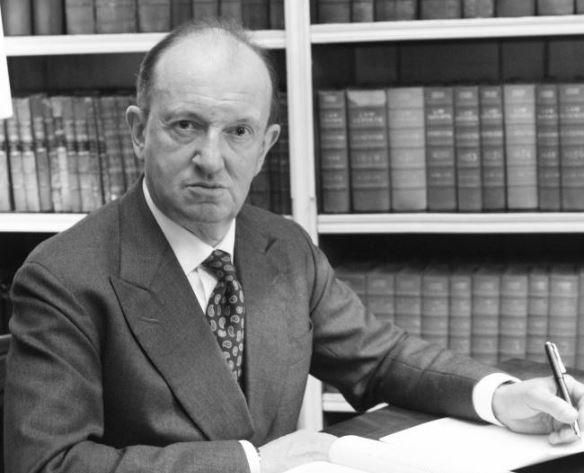
Members of the Inn, and of his chambers at Six Pump Court, were shocked and saddened to learn of Roy’s passing in August 2019, at the age of 69, after a short illness.
He was Called by Middle Temple to the Bar of England and Wales in 1990 and took Silk here in 2008. He had a flat in the Inn where he spent much time in his later years and served the Inn as a member of the Estates Committee.
His roots however remained in Scotland, and we are indebted to Lord Stephen Woolman, who sits as a Senator of the College of Justice in the Inner House in Edinburgh, for permission to use the following extracts from his eulogy, delivered at Roy’s memorial service in the Chapel of Loretto School.
Although proud of his Paisley upbringing, Roy was not technically a ‘Buddy’. He was born in a nursing home in Sauchiehall Street, Glasgow.
He and his younger sister Candy were always close. But annual holidays in the car did not bring out their best. Their father Robert built a wall of luggage on the back seat to avoid strife. Their mother Janet did not believe that her children fought.
Holidays played an important role in Roy’s life. In March 1984 he met Fiona, when they were both skiing in Switzerland. He glimpsed her across a crowded bar. He was smitten. Soon he realised that she was the love of his life. Their wedding took place later that year.
Rory, Camilla and Phoebe arrived and enriched the texture of life. They bonded over dogs, cars and horses. The children recall familiar scenes. Waiting for a breakdown lorry to tow some exotic car, perhaps the Lagonda, back to the garage. Roy transforming himself into a man of the turf with a keen interest in point to point competitions as well as the occasional flutter.
Roy often told affectionate stories about his family. The droller his tone, the more evident was the great bond of love that he felt. He was a devoted husband and father. That was shown clearly at the wedding of Rory and Emily in April of this year. Roy was so happy and proud.
After Paisley Grammar and the University, Glasgow (never Glasgow University, according to ‘stickler’ Roy), he was articled to a firm of Edinburgh solicitors, where he stayed on after qualification.
He then elected to try a career at the Bar. He devilled to two distinguished lawyers: Arthur Hamilton & Robin McEwan. Roy passed advocate in 1976 (again being a stickler, he insisted that no-one was ever ‘Called’ to the Scots Bar).
The Faculty of Advocates is an intellectual bourse. Stocks rise and fall. Roy proved to be a ‘blue riband’ share from the outset. Solicitors and clients clamoured for his services. He became the ‘go to’ counsel for important inquiries, such as those concerning the Harris super-quarry, the ICL Stockline explosion, and Edinburgh Trams.
He rose early to prepare his cases and brought his considerable intellect to his written and oral work. But his study door was always open. The family could ask for his advice and support at any time.
His fellow advocates recognised Roy’s fine qualities. They bestowed on him their highest honour by electing him Dean of Faculty. He served in that office with distinction, as he had previously done as Vice Dean. He championed the interests of every member of Faculty.
Why did Roy not become a Senator of the College
of Justice? That question has exercised many minds, including his own. My view is that his independence was too precious to him. He prized the buccaneering aspect of his role. That is evident in the ‘Bench and Bar’ painting that hangs in the box corridor of Parliament House. It shows Roy addressing a full bench of judges with undisguised brio.
Latterly, he found it highly rewarding to sit as an appeal judge in the Channel Islands. In late June 2019 he issued the leading judgment in a case involving an abstruse point of Jersey trust law. In a concurring opinion, the senior judge of Jersey, the Bailiff, paid tribute to the ‘clarity and insight‘ of Roy’s opinion.
Roy had a fine mind, one he kept constantly engaged. Whether it was politics, law, or syntax, Roy had a view. Often, it was a decided view. He would advance it with power and skill. It was therefore best to know his prejudices.
But he was always open to counterargument. He enjoyed big and small questions. A discussion on the use of the semi-colon might breeze without friction to Brexit, horse- racing, or Blower Bentleys.
Roy liked to socialise. He proclaimed himself a boy from Paisley but moved easily in all company. Whether asking for directions in the East End of Glasgow, or lunching at the New Club or the Garrick, he treated everyone the same.
It was always fun to be in his company and a lottery win to be placed beside him at lunch or dinner. Like his favourite drink, champagne, he fizzed.
But he was man of great integrity. He did not break a confidence entrusted to him.
If manners maketh the man, then Roy was a made man. He displayed exquisite courtesy on all occasions.

